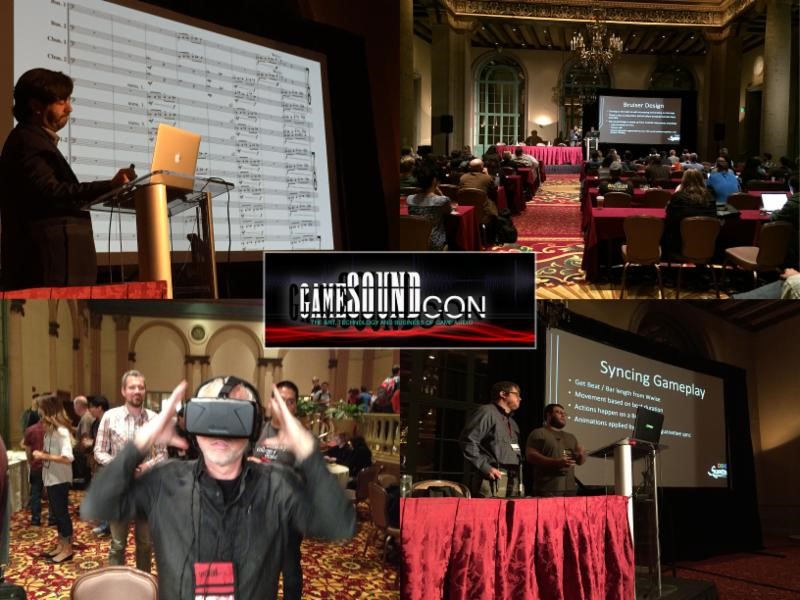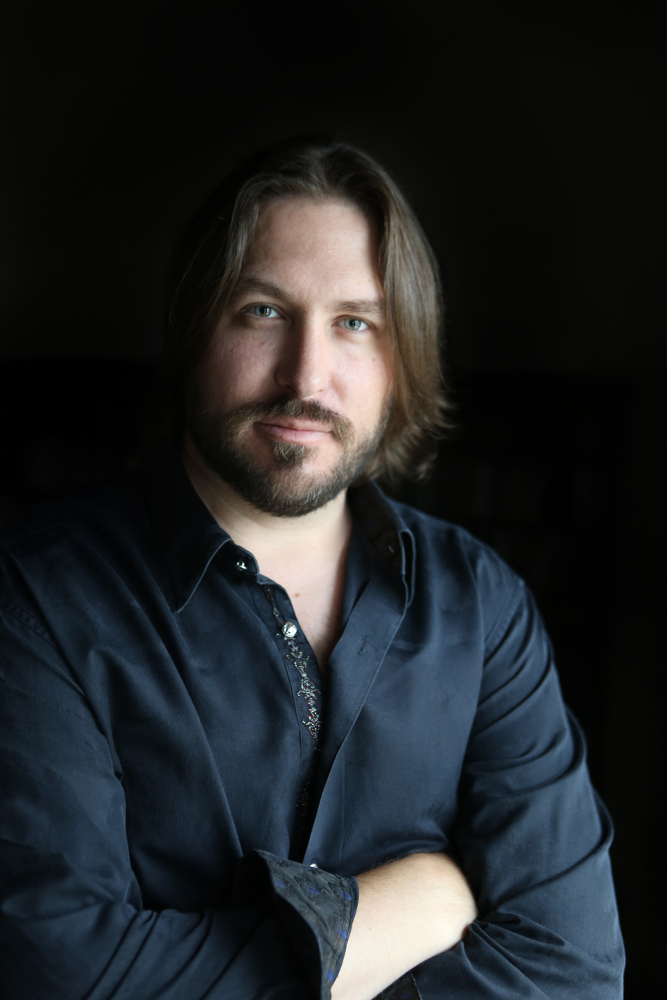Shifting Storylines for Video Game Music: “World of Warcraft” Composer Neal Acree
It’s a perfect 10 for GameSoundCon. This busy conference for video game music and sound design has hit the decade mark, marking its 10th anniversary at the Millennium Biltmore Hotel in Los Angeles, CA, on October 9 and 10, 2018.
A hotbed of networking and next-level knowledge, GameSoundCon hosts composers, sound designers, programmers, VO artists, researchers and others working in game audio, including VR (virtual reality) and AR (augmented reality). The objective: push the industry forward, and make space for fresh talent and innovators. (Visit here for more details on the event’s offerings and pricing.)
Among the many speakers at GSC will be composer Neal Acree. A certifiable triple threat who has made his name in film, television and video games, his work includes huge game franchises like World of Warcraft, Overwatch, StarCraft, Diablo, and the Chinese MMO Revelation Online. He’s been behind the music for shows like Stargate SG-1, Stargate Atlantis, and Witchblade and plus 30 feature films.
A versatile and prolific composer with roots in classical, rock, electronic music and world music Neal Acree’s music has been recorded and performed by orchestras around the world including the hit concert tour Video Games Live.
While the big screen has its allure, the LA-based Acree has been set free by the video game world. According to him, working in this medium means the composer can not only break the rules — they just may be the one that writes them in a field that’s maturing quickly. “It’s not just about saving the princess anymore,” Acree says. Find out why in this level-up convo with SonicScoop.

Neal, you’ve proven equally adept at film, TV and video game composing. In what way are these three genres the same, and in what ways are they markedly different?
As far as I’m concerned from a compositional standpoint there isn’t much difference between them. I never set out to write “video game music,” meaning there aren’t specific chord progressions, scales or tonalities that I attribute to each. All of them are designed to create an emotional experience for the listener and to help illuminate and amplify the narrative. I’ve written big, epic stuff for all three mediums and I’ve written small, intimate stuff for them as well.
The only real difference in style and approach come from the different ways people will experience the music while watching/playing. Film music is synchronized to picture as is TV, and game music mostly accompanies a narrative without cuts and that can change with the player’s choices. A film has two hours to tell a story; a tv show might have 10 seasons and tell many stories within that. And games might only tell one story but the players will live in that story for many hours.
Another difference is in the different types of stories being told through the various platforms, though the lines between them are blurred more and more each year. With expansions, games evolve and develop over long periods like the story arc of a television series, and can be as epic in scope and reach as the biggest movies. TV can be everything from a small, character-driven drama to a sprawling, epic saga like “Game of Thrones.” When I worked on the “Stargate” series, we covered everything from epic space battles to intimate character pieces. Games are evolving as well and creative developers are taking chances on all kinds of new and exciting directions. It’s not just about saving the princess anymore.
It all really comes down to creating a sound and an identity to the music, often through thematic writing, and telling each story the way it wants to be told.
What are the specific challenges that you’re signing up for when you agree to take on a video game score? In other words, what are the mental gymnastics a composer has to perform as a video game project unfolds?
Great question! The main challenge of video games is writing music that will cover a wide range of gameplay scenarios in one piece without annoying the player over time. People often put a lot more hours into a game than into watching a movie and will be hearing the music a lot. Non-interactive music might need to create a mood and an identity for a place where the players do everything from battle to explore to just stand there. It often needs to be memorable and evocative without being noticed at all.
Another challenge is that while many games are fundamentally similar in approach, you may be dealing with a whole new set of rules each time, and you may even be the one making those rules for the music. Will the music exist as an ambient bed that plays at random intervals or will it be interactive and increase in intensity as you get closer to danger? Or will it only play at key moments during the game to help alert the players that the end of a match is coming? Every game is different, so the first step is always to define what the music’s role will be in the game and figure out what the technical capabilities and limitations of the engine are.
Conversely, what are the unique opportunities that a video game score project creates?
The same things that make game music challenging on a technical level are also what make it such a fascinating and exciting medium to work in. The ability to create music that actually changes to adapt to the gameplay is the next level in storytelling. Also, the ability to write music without the constraints of having it line up perfectly to picture can be very freeing.
Super Conductor
Does your LA studio have a name?
I have unofficially dubbed my studio “The Lodge” because the walls and ceiling are covered in dark wood, there is a bar in the corner and it just kind of reminds me of an old school 1950’s ski lodge.
When I moved in to the space, there was a hook high up on the wall that could easily have been holding up a moose head or something. Now it’s a bit of a “Star Wars” museum, as I’ve found that surrounding myself with things that inspired me as a kid are very conducive to creativity as an adult.
Are there aspects of The Lodge, that are specific to scoring for video games — what are the technical and creative accommodations you make for the genre?
There isn’t anything in terms of “gear” that is different for game music production. The writing, recording and mixing process is virtually identical. The only real difference is in software. Game music needs specific software to implement it into the game, though this is often done by the developer.
On the opposite end of the spectrum, do you conduct orchestras for the recording of your scores, or mostly for public performance? What is uniquely intense about that experience, and when does a composer know they’re ready to take that responsibility on?
I actually rarely conduct during recording sessions. When I do it is for public concerts. The reason for that is that in addition to being the composer I am also producing the music, in the sense that I’m responsible for making sure the recording is exactly what I need it to be. I also often work with directors, and the immediacy of being able to communicate in the room together is crucial with the time constraints we often have.
As far as conducting in front of an audience, it’s the most intense and exhilarating thing you can do, especially for someone like me who started out as a guitar player and only got into conducting relatively recently. Standing between the audience and the orchestra and feeling the weight of the music under the baton is indescribable. Terrifying but surreal and intensely gratifying.
I think performing is the deepest connection you can have to the music and to the audience. This is special to me since I spend most of my time alone in a studio never knowing who the music will reach and how it will effect them.
On at the ‘Con
You’ll be speaking at GameSoundCon this year. Why did you choose to be involved with the conference, and what will you be speaking on?
I attended the very first GameSoundCon when I was just beginning to transition into composing for games and found it to be an extremely valuable resource. I spoke there for the first time last year and had a great response, so I’m excited to be back again this year.
I’ll be speaking on a panel called “The War Bards” with Emmanuel Lagumbay, Edouard Brenneissen, Gerard Marino and Chance Thomas. We’ll be discussing music for competitive games.
Is there a common thread that distinguishes people who concentrate in game sound from other sound/audio fields? What makes game sound pros unique, in your opinion?
I’ve had the good fortune of working with a lot of great people in the game industry. People that really love what they do. Games are a little more team-oriented than film because they take longer to make, they need more content and developers often have their own staff composers and sound designers working solely on their games.
How have you seen the game audio industry evolving? What makes it a great field to be involved in right now, and what makes it tough?

GameSoundCon takes place October 9-10 in LA.
I think the past 10 years or so has seen a lot more people migrating over from the film industry and a lot more people interested in the field in general. This makes for a lot more competition but it also means an increasing acceptance of games as an artform. Game audio categories are now included in the MPSE Golden Reel awards that used to only focus on film sound. As the generation that grew up on games continues to populate the workforce and as video games continue to evolve as an artform, they will continue to gain acceptance on a critical level.
What makes it tough? Like all creative industries it is very competitive and while it may be thriving on many levels, studios close all the time. I think there is a perception from the outside that there is a virtually endless supply of money and jobs in the industry but it has its challenges and shortcomings like any other industry. Still, I for one am grateful for all the opportunities the game industry have given me. It’s the career I never knew I wanted but was meant for.
Inquiring minds want to know: What are some video games that you consider to be classics for their music or sound?
“Super Mario Brothers” for its unforgettable melodies. “Myst” for being one of the first games to use audio recordings as a soundtrack, pretty much opening the way for live orchestra to be used in game music. The original “World of Warcraft” for its iconic themes and sound.
Finally, what projects are coming up next for you?
I’m currently working on a Norse mythology inspired survival game called “Rend” for Frostkeep Studios. Working in it has been some of the most fun I’ve had making music, and I hope everyone will check it out when it’s released.
I also contributed to “World of Warcraft: Battle For Azeroth” which is out now. It’s the seventh WoW expansion I’ve been a part of, having started my game career with the opening cinematic for “The Burning Crusade.” I love the music in WoW, and it’s always such an honor to contribute to the legacy.
— David Weiss
Please note: When you buy products through links on this page, we may earn an affiliate commission.








